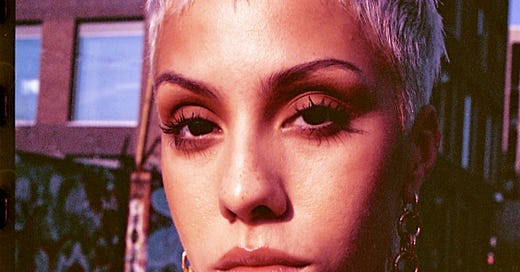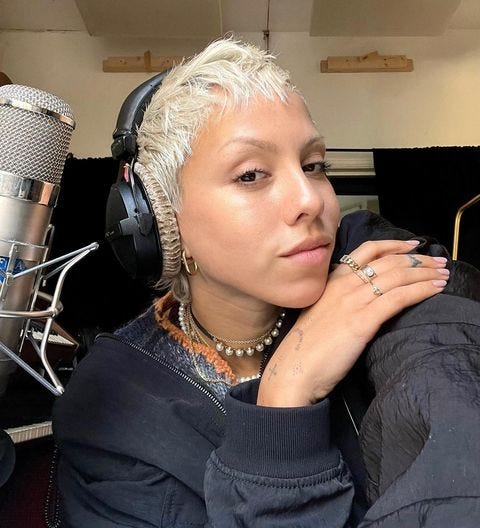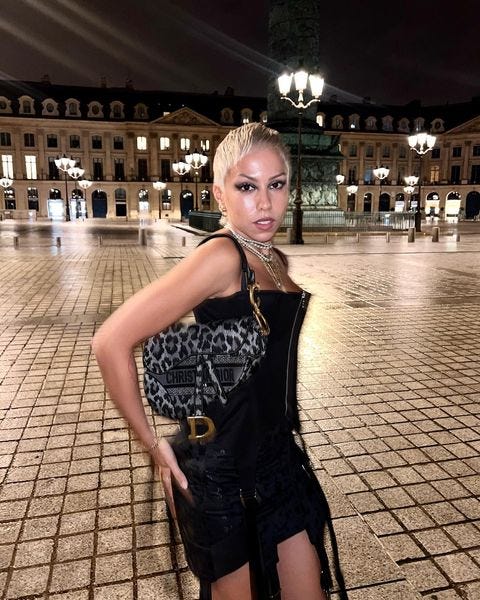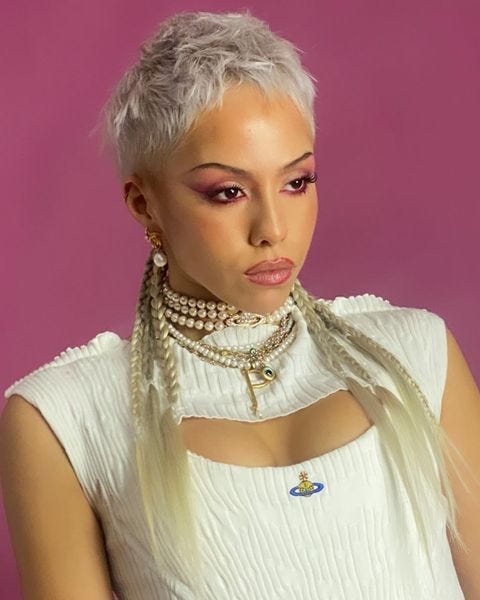Poppy Ajudha: “Regardless of how people see me, in my blood I’m still half-Black”
The musician on colourism, the nameless space of being mixed and decolonising privilege
Credit: Lennion Gregory
Hi, welcome back to Mixed Messages! This week I’m speaking to musician Poppy Ajudha, who is of mixed St Lucian and English heritage. Poppy’s music frequently tackles racism, colourism and identity, and our conversation spanned many of the same topics. I always say I learn something from every single interview I do, and that was never more true than with Poppy. Read on to hear her story and take note of this powerful voice.
What’s your family background, and what words do you use to talk about yourself?
I don’t tend to say mixed-race because it feels weird to me – we’re all one race, so mixed-heritage feels more accurate. My mum is white British, and my dad is from St Lucia. In the Caribbean, there’s such mixed communities, which can sometimes be confusing – part of our St Lucian heritage is Indian, who came over as indentured labourers. There’s a lot of layers to it. Even though to some extent I would call myself Black, I wouldn’t publicly. I would allow other people to call me Black.
I’m very light-skinned, but the darkest person in the family – my dad wasn’t with our family growing up. Being mixed was such a big thing, possible because I looked different to my sisters, who look completely white and have never identified with being mixed-race at all. My mum must have very strong genes!
Did you ever ever speak to your family about being mixed?
It wasn’t really a topic because my mum’s white and my sisters are white-passing. A lot of the things that they would have said have been quite racially changed. They would call me piggy because my nose was wider and pointed up more, but also equate that to my nose being like my dad’s. My sisters obviously didn’t realise at their age, but otherness, whether it was to do with my Blackness or, was very much a big part of my childhood.
I think my dad doesn’t really accept my Blackness, but maybe he doesn’t accept his own. Then I think my mum disregards my Blackness without really realising that’s what she’s doing. I think she wanted to feel like we had the same experience because I'm her child.
I was being told by people that I wasn’t Black because I think if people are a lot darker-skinned, they can’t comprehend how you’re not seen as white. But my family were teasing me for looking different to them. Then my Black family are telling me that I’m the white one in the family. It used to feel like such a dilemma, but I just don’t care anymore. The thing that’s hard for me is when people say I’m white, because I don’t feel like I’ve ever been treated like a white person. I have never connected to whiteness, white culture or white history as I have to Blackness.
And your Indian heritage?
I’ve never really been included in anything Asian related because people see me as being mixed-heritage on the Black side. I was on the BBC Asian network and there were all these jokes and cultural references I had no idea about. It was an interesting new othering. It’s just like a nameless space being mixed. I went to India and there was an element of feeling a bit of longing, like “actually I do feel like I look a bit Indian, but I’m never going to look like I’m from one place so it’s like, whatever, I’m an alien, I don’t care.”
When the term ‘woman of colour’ came about, I was like “finally, I can fit into that and no-one’s going to tell me that I can’t,” because it’s more broad.
Colourism is a topic you’ve spoken about a lot, including in your music.
Colourism feels like a tense topic. Most of the time I speak on colourism, it’s with people outside of the Black community. There’s a conversation to be had amongst Black people that isn’t happening.
I was talking to one of my sisters on my dad’s side the other day, and she is a more typically looking Black person, even though these descriptions are so arbitrary. Her partner argues that she’s not Black, which is something I never thought she’d experience as someone who looks way more Black than I do. It shows you the constructedness of colourism. We’re all mixed because of trade routes, migration and colonisation and that can’t be helped, but we use it as a way to elevate ourselves in these small power plays. “I’m oppressed in this way, so I’m going to oppress you in this way,” when actually we’re all being oppressed by the same larger construct. It’s easiest to enact that violence on those closest to you.
I think there’s a way to acknowledge the intersectionality of our differences and the different struggles – and levels to our struggles – while still being able to acknowledge our shared common issues and finding solidarity. I don’t think that as people of the diaspora we can find solidarity if we can’t acknowledge the issue of otherness and the element of internalised racism and self-hatred. The idea that if you’re mixed with anything then you’re less of something. If you do have a mix of anything that’s non-dark, then you do get a privilege and that’s a real life experience, but we have to decolonise the idea that you’re lucky to have that. If we don’t, I don’t think there’s any way to have a commonality amongst mixed people.
Has spending time in St Lucia been important for you and understanding yourself?
When I first went back as a teenager, connecting with my culture, from food to people to family, and really understanding where my dad was from and all the things that make up who I am, was very important to me.
I’m there a lot, so my cultural heritage is very St Lucian, which isn’t the same for all people from that diaspora. There may be people that have never been back home and their cultural understanding of who they are comes very much from their direct family and British culture.
In St Lucia, there’s a very colonial mentality and whiteness is preferred. My Indian-looking family prefers being lighter skinned, and the Black side of my family has a different feeling around who they are and their status to the Asian side of the family. Equally, being Western you’re treated differently. It’s interesting, the construct of Blackness in different spaces and how that’s related to Eurocentric ideas of Western ideology. To me, that shows the construct of race in a much more transparent way than we sometimes understand it in the UK or America.
How influential has the music you grew up around been in terms of the music you make now?
My dad owned a nightclub so I grew up around lots of different music. He would play roots reggae and Black-focused music, and my mum was into rare grooves and funk. Naturally that’s going to influence what I create.
My song Tepid Soul is about that feeling of fragmented identity, while Black Joy. Black Peace. Black Justice. is about racial violence and equality. There's always that imposter syndrome of “can I talk about this issue?” because I’m not dark-skinned. But regardless of how other people see me, regardless of how dark my skin is because of how much light there is in the sky, in my blood and heritage, I’m still half-Black.
[These topics] are always going to be something that I speak about. I try and write about it in the most perceptive and empathetic way I can. I never want to speak on anyone else's issue or assert myself in a way that takes up space in a way I shouldn’t.
Do you think the care and empathy with which you try to live your life has been influenced by being mixed?
I feel like someone who is always between two places in general: I’m not gay, I’m not straight, I’m not white, I’m not Black, I’m not middle class but I’m not the bottom of working class, one of my parents has done better in life while we grew up as a single parent family in a council house. Equally I present myself as androgynous a lot of the time, sometimes feminine, sometimes hyper masculine.
The fact that I’m mixed-race also means that I’m hyper-exoticised and sexualised because I’m seen as exotic, but still palatable to some extent. Even though that gives me a privilege, it also objectifies me, so that privilege shouldn't just be seen as a privilege, it should also be seen as an oppression. My privilege is only being given to me in a certain framework which I must sit in, related to my sexuality. That has heavily affected how I present myself in space, how I feel safe and how I was perceived growing up as soon as I hit puberty. I think it all feeds into each other somehow. I don't know how that would be different if I looked different or was from different places.
Do you think there’s a stereotype of what it means to be mixed? Are there ways you want the conversation to push forward instead of what we’re already talking about?
I don’t think we are talking about it. I don’t think there’s any conversation about people of mixed heritage because it’s hard to put in a box. Culture and society likes things that are definable. The fact that I can’t fill out a form and put where I’m from… I’m over it man.
I think in terms of healing and solidarity amongst the Black community, conversations around colourism amongst people of different mixes would be really cathartic and important and aren’t being heard at all. We’re not getting to that because we’re dealing with so much race-based violence and things that are much more like life threatening.
What’s one of the best things about being mixed for you?
It's so funny you asked that because it's almost like you're not allowed to find positives in it, because, in my experience, that would almost be to like the things that make you more white. I love my skin tone, but if I were to say that, am I saying that I wouldn’t like it if it was darker?
I think there’s a beauty in being ambiguous to some extent. You can cross over into different spaces and maybe that allows you to bring a new perspective into the world and identify with others that don’t fit into a space. If I can connect with someone who’s othered in terms of ableism, their sexuality or whatever, because of my heritage, that’s useful. I like the way that I am and I wouldn't want to be any other way – I guess that's what I like about being mixed.
Can you sum up your mixed experience in a single word?
Confusing instantly came to mind. I’m not lost as to who I am, but I think you’re constantly having to reconfront who you are because every new person you meet wants to know where you’re from.
Next week I’ll be talking to author and film critic Hanna Flint. Subscribe to get Mixed Messages in your inbox on Monday.
Enjoy Mixed Messages? Support me on Ko-Fi! Your donations, which can start from £3, help me pay for the transcription software needed to keep this newsletter weekly, as well as special treats for subscribers.
Mixed Messages is a weekly exploration of the mixed-race experience, from me, Isabella Silvers. My mom is Punjabi (by way of East Africa) and my dad is white British, but finding my place between these two cultures hasn’t always been easy. That’s why I started Mixed Messages, where each week I’ll speak to a prominent mixed voice to delve into what it really feels like to be mixed








Thank you for this newsletter. I enjoy learning and reading. I feel like I can connect with so much of the conversations.
This is fantastically nuanced and whilst I can't relate directly to most of it, I do relate to others, particularly in terms of being able to connect to others (or empathise?) in different ways, as well as some frustrations. It's always great to hear these perspectives, to open the conversations - thank you both!